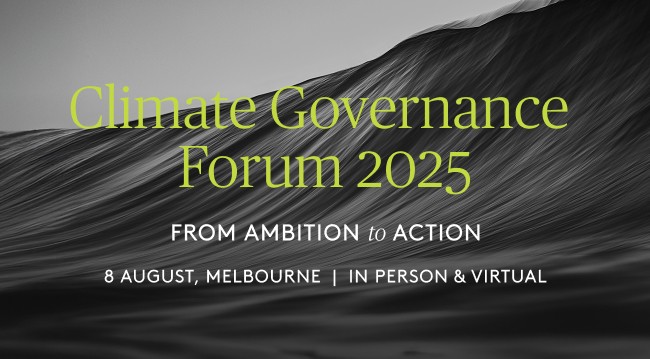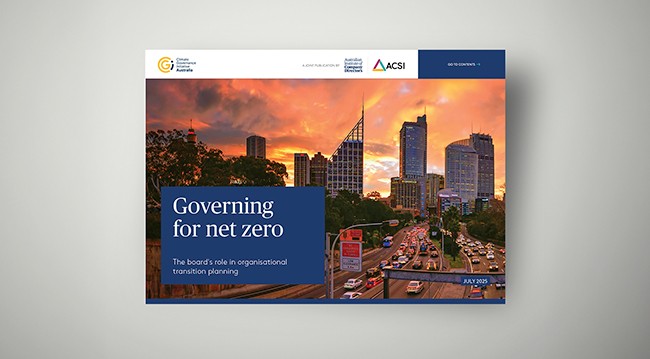This week, the AICD published Governing for Net Zero: The Board’s Role in Organisational Transition Planning, a new guide developed with the Australian Council of Superannuation Investors (ACSI) to support directors in overseeing credible, fit-for-purpose climate transition plans.
With climate governance continuing to be a key long-term priority for boards, we also reveal the key speakers and sessions at the Climate Governance Forum 2025, a one-day opportunity for directors to build climate capability, understand regulatory and investor perspectives, and learn from peer experience.
Also in this newsletter:
- What three years of AICD’s climate governance work reveal about progress, gaps and leadership in Australian boardrooms
- The EU Council has proposed narrowing sustainability reporting rules by increasing company size thresholds
- Market developments update: Climate-related disaster costs soar in NSW; ACCC commences greenwashing proceedings; ASIC reinforces climate disclosure focus; and the UK advances sustainability reporting and assurance reforms.
Climate Governance Forum 2025: speakers announced
Friday, 8 August 2025 | Melbourne | In person and virtual
At this year’s Climate Governance Forum, gain insights from peers and experts on how boards are strengthening climate governance, embedding climate and nature into strategic planning, and preparing for increasing investor and regulatory expectations.
Just announced: Tom Pockett MAICD (Chair, IAG; Stockland) will deliver the opening keynote, sharing lessons on navigating climate complexity across insurance, property and financial services. A flagship panel with The Hon Matt Kean (Chair, Climate Change Authority), Vanessa Sullivan GAICD (NED, AGL; CSIRO) and Geoff Summerhayes GAICD (Chair, Zurich Australia; Heartland Bank) will examine how boards are translating strategy into results in a shifting capital market landscape.
Key sessions will offer practical guidance on:·
- Mandatory climate reporting, with insights from Rebecca McGrath AM FAICD, Kate O’Rourke
(ASIC) and others - Financing the transition, featuring Penny Bingham-Hall FAICD, Michael Ullmer AO FAICD and Zoe Whitton (Pollination; NZEA)
- Climate science for directors, with leading Australian expert, Professor David Karoly
Attendees will also hear how climate is being embedded in sectors like professional sport, with insights from Andrew Fraser GAICD (ART; Brisbane Broncos), Tom Campbell (Footy for Climate) and Kate Roffey AM GAICD. Barry Sterland PSM (Productivity Commission), Tony Wood MAICD (Grattan Institute), and more will share how climate strategy is being used as a lever for productivity, innovation and growth. Register now.
New board resource: Governing for net zero
Governing for net zero: The board's role in organisational transition planning provides timely guidance for organisations navigating the shift to a low-carbon economy. Drawing on insights from directors and investors with practical experience in preparing and assessing company transition plans, the guide also includes an overview of directors’ legal obligations.
The joint guide from the AICD and ACSI includes a Foreword by the Treasurer, the Hon Dr Jim Chalmers MP, and comes at a time when companies and investors increasingly recognise the commercial case for addressing climate risk and preparing for transition opportunities.

What three years reveal about boardroom climate action
Since 2022, climate governance has become a mainstream consideration for Australian boards. As directors respond to mandatory reporting, investor scrutiny and rising physical risks, many have moved beyond foundational awareness toward more structured, forward-looking transition planning. But progress remains uneven.
We reflect on three years of AICD’s climate governance work, examining how the landscape has evolved, where boards are making the greatest strides, and what lessons can be drawn from those leading the way.
Market developments update
- In June, the EU Council agreed on its negotiating mandate for the ‘Omnibus I’ proposal to simplify the Corporate Sustainability Reporting Directive (CSRD), which requires companies operating in the EU to disclose detailed ESG information, aiming to reduce administrative burden and ease compliance for smaller companies. It has proposed raising applicability thresholds – limiting CSRD to companies with over 1,000 employees and €450 million in turnover, and the Corporate Sustainability Due Diligence Directive thresholds to those with at least 5,000 employees and €1.5 billion in turnover. These changes represent a major shift, concentrating obligations on larger firms considered better equipped to manage sustainability and due diligence requirements.
- From the regulators: The ACCC has launched Federal Court proceedings against Australian Gas Networks for alleged greenwashing, claiming its ‘renewable gas' campaign misled consumers about the environmental credentials of gas; ASIC has re-flagged sustainability-related disclosures as a key area of focus for financial reporting and audits in FY2025–26, reinforcing expectations around transparency and accuracy; the APRA 2025 Stakeholder Survey shows climate risk ranks lowest among top financial sector concerns, with 21 per cent of respondents rating it a critical or high risk over the next two years. By contrast, cyber security (91 per cent) and geopolitical risk (70 per cent) topped the list.
- State of climate: The NSW Budget reveals the economic toll of climate-related disasters has surged more than 1,000 per cent over six years, reaching $9.5 billion since the 2019–20 bushfires. In South Australia, a deadly marine algal bloom has caused widespread marine life deaths and spread to Adelaide’s beaches, with authorities warning of limited options to respond.
- Meanwhile, the Climate Change Authority is calling for stronger national leadership on climate adaptation and clean energy, warning that climate impacts are already driving up costs across sectors.
- In a National Press Club address, former Treasury Secretary and current Chair of the Australian Climate and Biodiversity Foundation, Ken Henry, argues that fixing Australia’s environment laws, to accelerate development approvals and safeguard nature, is more critical for lifting flagging productivity than tax reform.
- The Federal Court has found the Commonwealth does not owe a duty of care to Torres Strait Islander peoples to protect them from the impacts of climate change or fund adaptation measures. The ABC reports Judge Michael Wigney ruled Australia's greenhouse gas emissions targets are matters of 'core government policy' which should be decided by the parliament, not the courts.
- Ahead of the Australian Government’s expected 2035 target announcement in September, a new EY Net Zero Centre report finds that a 65–75 per cent emissions reduction by 2035 would be 'proportionate and practical', with most cuts achievable through cost-saving measures across buildings, transport, and industry.
- Australia's major banks are under renewed scrutiny over their exposure to deforestation, fossil fuels, and methane emissions. New analysis alleges continued financing of climate-harming activities despite net zero commitments, with calls for stronger accountability. Meanwhile, HSBC has exited a leading banks’ climate alliance NZBA, after several major Wall Street banks withdrew.
- The UK government has launched consultations on three fronts: the introduction of ISSB-aligned Sustainability Reporting Standards, mandatory disclosure of climate transition plans for major entities, and a voluntary registration scheme for third-party sustainability assurance providers.
- The IFRS Foundation has published jurisdictional profiles for 17 countries including Australia (and snapshots for 16 more), showcasing that 36 jurisdictions are either adopting or progressing toward alignment with ISSB sustainability standards – signalling a growing global baseline for comparable sustainability disclosures.
- Reuters reports the passing of the US’s ‘big beautiful’ bill is projected to significantly weaken renewable energy policy, with analysis suggesting it could add 7 billion tonnes of emissions by 2030 compared to Biden-era targets. This emissions gap could result in over USD 1.6 trillion in global climate damages, highlighting the high stakes of US policy shifts for the global transition.
- Australia has reignited its green hydrogen ambitions with renewed federal investment, including $432million backing for Orica’s Hunter Valley Hydrogen Hub and a Port of Newcastle-led project transitioning to green hydrogen production. During his visit to China, Prime Minister Anthony Albanese emphasised the strategic importance of green steel in fostering clean energy collaboration.
For the calendar:
- 8 August – Climate Governance Forum 2025, Melbourne & Virtual
- Monthly – Climate Governance for Australian Directors Short Course
- Anytime – Introduction to Climate Governance – Free for member Online Module
We would welcome feedback on this newsletter. To share your thoughts, please contact Kulja Coulston via email at policy@aicd.com.au.
Already a member?
Login to view this content





